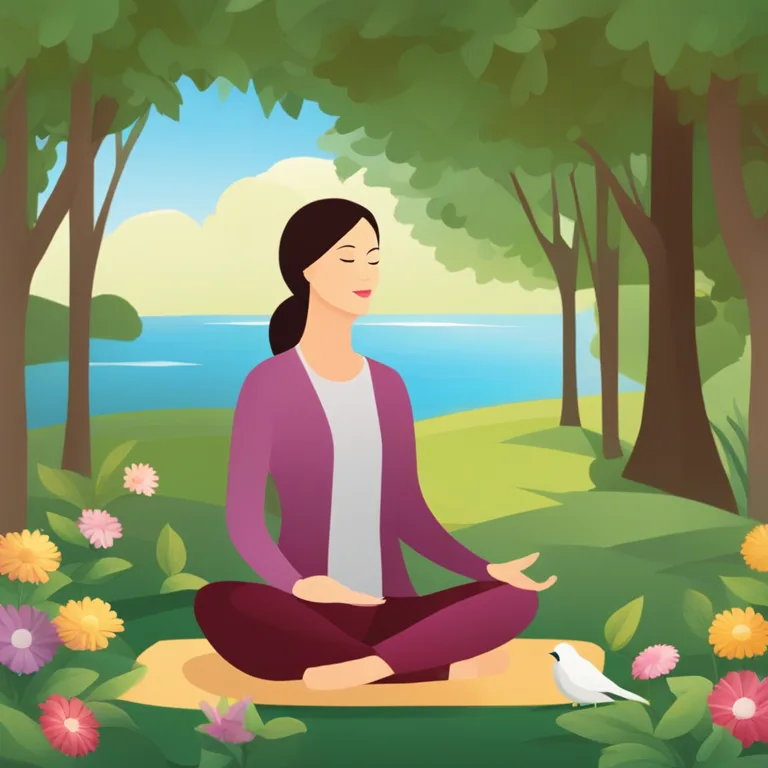
Meditation Techniques to Ease Menopause Symptoms
Discover meditation strategies tailored for menopause relief, focusing on hormonal balance and emotional wellness for a better quality of life.
article by Hina Kurosawa
The Importance of Meditation During Menopause
Meditation has long been revered for its capacity to generate calm and improve the human experience. As we gaze into the horizon of 2024, the necessity for meditation becomes paramount, especially for women undergoing menopause. This thoughtful practice aids in balancing hormones and managing the psychophysiological changes that accompany this life stage. The symptoms of menopause, including hot flashes, mood swings, and sleep disturbances, call for holistic solutions. Engaging in meditation can provide non-pharmacological support, reducing stress levels and enhancing overall well-being. The serenity achieved through meditation equips women to navigate menopause with grace and resilience.

Mindfulness Meditation for Emotional Regulation
Mindfulness meditation encourages an acute awareness of the present moment while acknowledging and accepting one's feelings, thoughts, and bodily sensations. It's a tool that can be exceedingly beneficial for managing menopausal mood fluctuations. By fostering a state of non-judgmental presence, women can observe their thoughts without being overwhelmed by them. This results in a decreased reactivity to emotional triggers and promotes a calm, centered approach to life's challenges. Mindfulness can be practiced anytime, but establishing a routine will bolster its efficacy in regulating emotions during menopause.

Breath-Focused Meditation to Combat Stress
Focused breathing exercises stand at the core of many meditation practices. They are particularly effective for reducing the stress that can exacerbate menopausal symptoms. Diaphragmatic breathing or "belly breathing" soothes the nervous system and lowers the heart rate, providing an oasis of tranquility amidst the chaos of hormonal upheaval. Engaging in daily breathing meditation will create a sense of mastery over the stress response, offering women a haven of peace when hot flashes or anxiety strike.

Progressive Relaxation for Improved Sleep Quality
Sleep disturbances plague many women during menopause, leading to a cascade of daytime tiredness and reduced mental sharpness. Progressive muscle relaxation is a meditation technique that can significantly enhance sleep quality. It involves sequentially tensing and relaxing various muscle groups and paying attention to the contrasting sensations. This method encourages the shedding of physical tension and fosters a deeper state of relaxation, paving the way for restorative sleep—a crucial component in combatting menopausal insomnia.

Guided Visualization to Alleviate Hot Flashes
Guided visualization, or guided imagery, has emerged as a potent tool for lessening the frequency and severity of hot flashes. Through the power of imagination, one can evoke cooling images or scenes, engaging the mind to influence physical sensation. Whether it's envisioning a snow-capped mountain or feeling a gentle sea breeze, this mental escape can trigger real physiological responses, such as reducing body temperature and promoting a sense of coolness.
Yoga Nidra: Deep Relaxation and Healing
Yoga Nidra is a meditative practice that promotes deep rest and can be particularly supportive during menopause. Often referred to as "yogic sleep," this technique guides practitioners into a state between wakefulness and sleeping, tapping into the body's natural healing capabilities. Yoga Nidra can aid in rebalancing hormones, soothing the adrenal glands, and nurturing the endocrine system, thereby alleviating menopausal distress.
Adapting Your Practice to Fit Your Lifestyle
While numerous meditation techniques are available, personalization is key. Women are encouraged to explore different styles and find a practice that resonates with their lifestyle and preferences. What matters most is consistency. Regular meditation cultivates resilience, making it easier to cope with menopause-related challenges. In an era where wellness is paramount, incorporating meditation into daily routines is a proactive step towards hormonal harmony and improved life quality.
Published: 1/8/2024
Modified: 1/8/2024
More predictions
Come back here soon to learn more about yourself and your future


Meditation: Finger Techniques Explored
Discover the art of finger meditation to harmonize body, mind, and spirit through ancient practices for modern wellness.


Jain Meditation Techniques for Inner Peace
Discover the serenity and spiritual depth of Jain meditation practices in a comprehensive article tailored for modern seekers.


Diverse Meditation Techniques
Explore various meditation methods to enhance your mental clarity, emotional balance, and spiritual insight.